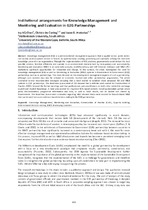Institutional arrangements for Knowledge management and monitoring and evaluation in G2G partnerships
Abstract
Knowledge management (KM) is a well-established management approach that is applied across public sector, civil society (and corporate sectors in future) by systematically creating, preserving and optimally utilising the extensive knowledge present in an organisation. Through the implementation of KM practices, governments could deliver the best possible services, function efficiently and operate in an environment characterised by transparency and accountability. Monitoring and evaluation (M&E) is an extremely complex, multidisciplinary and skill intensive endeavor and M&E offer institutions significant opportunities for innovation and change.
In this context, the study investigated the need for knowledge management (KM) as well as Monitoring & Evaluation (M&E) systems in Government to Government (G2G) partnerships such as in partnerships. This study focused on the development management aspects of such a partnership, although such systems may also be relevant to economic, tourism and other partnerships programmes.
The article concluded several recommended strategies including that a need existed to establish more advanced KM and M&E systems in G2G partnerships. The Readiness Assessment of KM showed that a definite need existed for Communities of Practice (COPs) beyond the formal meetings and that professionals and practitioners on both sides needed to exchange explicit and implicit knowledge. A need also existed for improved ICTs based-systems including dedicated portals where policy documentation, programme information and data, as well as M&E results, can be loaded and shared by Governments. The Readiness Assessment conducted regarding M&E showed that a need existed for Results-Based M&E that can be used to ensure evidence-based decision-making in the G2G partnerships.

